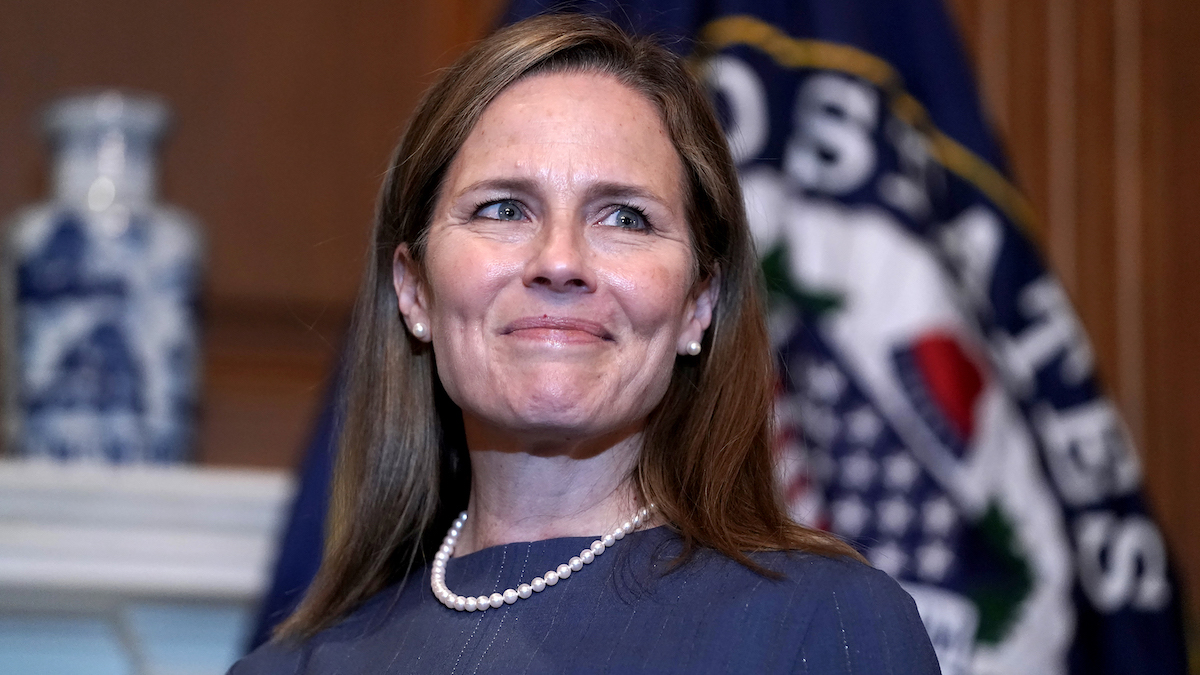Amy Coney Barrett Worked Some Real Karen Nonsense Into Her Opinion in Trump’s Colorado Ballot Case

This morning, the U.S. Supreme Court issued a decision declaring Donald Trump’s name must be included on Colorado’s primary ballot. This decision obviously sucks but looking closer at the details of the opinions written, Justice Amy Coney Barrett found ways to make her part of things even suckier.
Back in December, the Colorado Supreme Court ruled that Trump could be excluded from the primary ballot thanks to Section 3 of the 14th Amendment of the U.S. Constitution, which says an elected official who has taken an oath to support the Constitution cannot engage in insurrection (e.g. encouraging his supporters to storm the U.S. Capitol to overtun the results of an election) and then return to office.
Now the U.S. Supreme Court has overturned that decision, basically because they’ve found the one thing they don’t think should be left up to “states’ rights.”
“[R]esponsibility for enforcing Section 3 against federal officeholders and candidates rests with Congress and not the States,” the opinion, supported by Chief Justice John Roberts and Justices Clarence Thomas, Samuel Alito, Neil Gorsuch and Brett Kavanaugh, reads.
The court’s liberal justices ultimately agreed with the decision, though they wrote a concurring opinion making it clear the opinion goes too far and is too broad. They also took issue with the court’s decision to rule on the case in the first place.
Justices Sonia Sotomayor, Elena Kagan, and Ketanji Brown Jackson quote Justice Roberts himself from his decision in Dobbs v. Jackson WHO that overturned Roe v. Wade: “If it is not necessary to decide more to dispose of a case, then it is necessary not to decide more.”
The women write in their concurrence that “the Court continues to resolve questions not before us. In a case involving no federal action whatsoever, the Court opines on how federal enforcement of Section 3 must proceed.”
“We cannot join an opinion that decides momentous and difficult issues unnecessarily,” they write.
What did Amy Coney Barrett write in her opinion?
Amy Coney Barrett wrote a concurring opinion of her own. While she also thinks the majority opinion goes to far, she chose to use her space to take aim at those liberal justices—who, again, ultimately agree with the decision!—for daring to offer any criticism at all.
Here’s the notable bit of Barrett’s brief opinion:
The majority’s choice of a different path leaves the remaining Justices with a choice of how to respond. In my judgment, this is not the time to amplify disagreement with stridency. The Court has settled a politically charged issue in the volatile season of a Presidential election. Particularly in this circumstance, writings on the Court should turn the national temperature down, not up. For present purposes, our differences are far less important than our unanimity: All nine Justices agree on the outcome of this case. That is the message Americans should take home.
What is Barrett saying there? For those who aren’t fluent in Supreme Court Passive Aggression, let’s break it down. Basically, she’s accusing those liberal justices of “amplifying disagreement” by arguing that this was not a case they should have taken up. The court is not *supposed* to get involved in politics (ha!) but Barrett is proud of having “settled a politically charged issue” during this election season, not clarifying what she sees as the difference between “settling” and interfering.
Her declaration that “writings on the Court should turn the national temperature down, not up,” should be infuriatingly laughable to anyone who’s paid attention to just about any single decision issued by the conservative justices in recent years. This is like hearing Marjorie Taylor Greene demanding “decorum” in Congress. The total obliviousness would be hilarious if it didn’t come from people with so much power.
Finally, Barrett is telling the American people not to listen to the liberal justices. “[O]ur differences are far less important than our unanimity,” she writes, telling us that everyone agrees Trump can be on the ballot and anything else is just, I don’t know what. Sour grapes at best and at worst, an attempt to fuel our (accurate) perception of the court as an active arm of the extreme political right, I suppose.
Essentially:
(featured image: Greg Nash-Pool/Getty Images)
Have a tip we should know? tips@themarysue.com